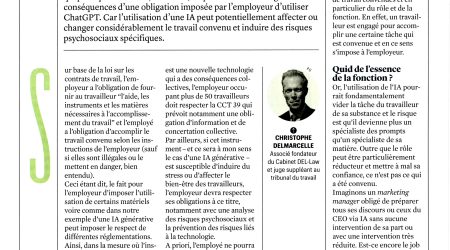Can an employee block his reintegration route?
Posted the 27 December 2019Long-term absence and return to work In order to promote the return to work of workers on long-term absence, the legislator has organised a ‘reintegration path’ which can be initiated either by the worker himself or by the...
Long-term absence and return to work
In order to promote the return to work of workers on long-term absence, the legislator has organised a ‘reintegration pathway’ which can be initiated either by the worker or by the employer no earlier than four months after the start of the incapacity. At the end of the reintegration period, the options are, in brief: - return to the job with or without adaptation(s) of the workstation - return to an adapted job or another job - definitive inability to resume the agreed job, without the possibility of taking another job with the employer. In the latter case, in order to be able to terminate the employment contract on medical grounds of force majeure, the employee must have been declared definitively unfit after the reintegration route has been completed.
Refusal of reinstatement
Under the procedure, the prevention consultant/occupational physician invites the employee to an assessment interview. It is during this consultation that he examines whether the employee can once again carry out the work agreed upon, if necessary with an adaptation of the workstation, and that he examines the possibilities of reintegration, based on the employee's work capacity. One way of blocking the reintegration process is for the employee not to attend this interview. The doctor is then unable to assess the employee's chances of returning to work. De facto, the reintegration process is thus blocked, and with it any possibility for the employer to invoke breach of contract on grounds of force majeure…
Can the employer take action?
This does not mean that the employer can do nothing. In fact, the existence of a contract of employment implies that the employer can exercise authority over the employee, i.e. give him instructions or orders that the latter must in principle follow, provided that they are legitimate. The employer could therefore order the employee to attend the consultation. Obviously, he must keep proof of this order. And in the event of repeated refusal, the employer may impose a disciplinary sanction or dismiss the employee, even on serious grounds.
The company's interest
This solution is in the public interest. The aim of the reintegration programme is to get workers back to work - under the best possible conditions - because long-term absences are very costly for society.
The dismissal of an employee for illness raises the question of whether there is discrimination on the grounds of health.
By refusing to take part in the reintegration process (in any case, without valid reasons), the worker is therefore setting his personal interest against the common interest that governed the drafting of the law. This does not seem acceptable in this case. However, as the law is not clear, it would be useful for the employer to seek advice before taking any action.
It should be remembered that while it is possible to dismiss an employee who is absent due to illness, this systematically raises the question of whether there has been discrimination on the grounds of health. With the risk of having to pay six months' compensation for damages, in addition to compensation in lieu of notice.
Related articles
Anti-money laundering policy

Is an employer allowed to mandate the use of artificial intelligence tools by employees ? (Trends, 17-07-2025)
